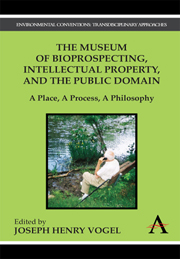 The Museum of Bioprospecting, Intellectual Property, and the Public Domain
The Museum of Bioprospecting, Intellectual Property, and the Public Domain Book contents
- Frontmatter
- Contents
- List of Figures
- Preface
- Acknowledgements
- Introduction: The Bauplan
- Chapter 1 Looking the Gorgon in the Face
- Chapter 2 Museums as Venues for Polemics
- Chapter 3 The Museum as a Vehicle for Considered Judgments on Access and Benefit Sharing
- Chapter 4 Clearing the Air: Applying the Intellectual Property Framework to National, Community, and Individual Rights in The Convention on Biological Diversity
- Chapter 5 The Anti-Commons Threat to Farmers' Rights: The Case of Crop Germplasm
- Chapter 6 The Moral Foundations of Intellectual Property and Conservation through Access and Benefit-Sharing
- Conclusions: The Nameless Interloper in The Museum of Bioprospecting, Intellectual Property, and the Public Domain
- Appendix: The Original Essay: A Proposal Based on “The Tragedy of the Commons:” Museum of Bioprospecting, Intellectual Property Rights, and the Public Domain
- Notes
- Index
Conclusions: The Nameless Interloper in The Museum of Bioprospecting, Intellectual Property, and the Public Domain
Published online by Cambridge University Press: 05 March 2012
- Frontmatter
- Contents
- List of Figures
- Preface
- Acknowledgements
- Introduction: The Bauplan
- Chapter 1 Looking the Gorgon in the Face
- Chapter 2 Museums as Venues for Polemics
- Chapter 3 The Museum as a Vehicle for Considered Judgments on Access and Benefit Sharing
- Chapter 4 Clearing the Air: Applying the Intellectual Property Framework to National, Community, and Individual Rights in The Convention on Biological Diversity
- Chapter 5 The Anti-Commons Threat to Farmers' Rights: The Case of Crop Germplasm
- Chapter 6 The Moral Foundations of Intellectual Property and Conservation through Access and Benefit-Sharing
- Conclusions: The Nameless Interloper in The Museum of Bioprospecting, Intellectual Property, and the Public Domain
- Appendix: The Original Essay: A Proposal Based on “The Tragedy of the Commons:” Museum of Bioprospecting, Intellectual Property Rights, and the Public Domain
- Notes
- Index
Summary
Where does one begin to discuss a tour-de-force? Perhaps the best place is the beginning. After the title page, the editor, Joseph Henry Vogel, dedicates the anthology to Darrell Posey who died in 2001 at the age of 53. Posey was a pioneer in the interdisciplinary analysis of “intellectual property rights” (IPR) and “traditional knowledge” (TK). He would often intervene at the Conference of the Parties (COP) during the public commentary and introduce himself “Darrell Posey, and I am proud to say I am not a lawyer.” Although the corpus of Posey's work is only mentioned briefly in the volume, his spirit is there on every page, especially his humor. As Posey showed us, “bioprospecting, intellectual property, and the public domain” are not and cannot be the exclusive domain of the lawyers. The proposed museum is the latest attempt to broaden the dialog by creating a place which, as the subtitle of the anthology indicates, will also be process and a philosophy.
Where does one go next in discussing this roller-coaster ride of an introduction and six chapters, crisply written and packed with original ideas? In his capacity as editor, Vogel provides an easy solution to this seemingly impossible problem. It is the same one he uses to weave the chapters together into a meaningful whole: an interloper. I will review the anthology by focusing on how the interloper interlopes in each chapter.
- Type
- Chapter
- Information
- The Museum of Bioprospecting, Intellectual Property, and the Public DomainA Place, A Process, A Philosophy, pp. 89 - 102Publisher: Anthem PressPrint publication year: 2010


